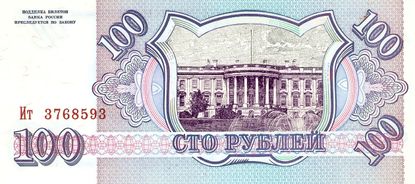Follow the rubles
Why Trump's massive cash purchases are so suggestive


Sometimes a news organization reports the results of a major investigation and you immediately know the story, not just what happened but why and what it means. Other times, the investigation leaves tantalizing questions unanswered, which is what happened when The Washington Post published this story over the weekend about the curious finances of the Trump Organization. It tells the tale of a transformation in President Trump's business that happened about a decade ago, one with no obvious reason behind it. There is an explanation, though, in a word that appears nowhere in the Post's story: Russia.
Here's where we start:
In the nine years before he ran for president, Donald Trump's company spent more than $400 million in cash on new properties — including 14 transactions paid for in full, without borrowing from banks — during a buying binge that defied real estate industry practices and Trump's own history as the self-described "King of Debt."Trump's vast outlay of cash, tracked through public records and totaled publicly here for the first time, provides a new window into the president's private company, which discloses few details about its finances.It shows that Trump had access to far more cash than previously known, despite his string of commercial bankruptcies and the Great Recession's hammering of the real estate industry. [The Washington Post]
Well, you might say, that just shows how successful he is! And that's the story Trump's family tells. "He had incredible cash flow and built incredible wealth," says Eric Trump. "He didn't need to think about borrowing for every transaction. We invested in ourselves."
Subscribe to The Week
Escape your echo chamber. Get the facts behind the news, plus analysis from multiple perspectives.

Sign up for The Week's Free Newsletters
From our morning news briefing to a weekly Good News Newsletter, get the best of The Week delivered directly to your inbox.
From our morning news briefing to a weekly Good News Newsletter, get the best of The Week delivered directly to your inbox.
Right. But to understand why this is suspicious, you have to know that just about everyone in the real estate business borrows money. For large projects especially, even major players — and Donald Trump is not a major player — aren't eager to put down tens or hundreds of millions of dollars in cash.
And the dates are significant. After a string of high-profile bankruptcies in the 1990s, Trump's access to capital had dried up; Deutsche Bank was pretty much the only major bank that would consider lending to him. He was branching out more into alleged scams like Trump University and licensing deals, which produce modest but steady income with little or no risk, since someone else is building the property and then Trump receives a fee for slapping his name on it. But he was still making large purchases in cash. Where was the money coming from?
There could be multiple answers, but again and again, we find suggestions that there was money pouring in from Russia, often via those who had looted the country in its transformation from communism to kleptocracy.
First, you have the reports that some time ago, Trump properties allegedly became a fashionable means by which crooks in the former Soviet Union could launder their money. As Craig Unger reported last year, "Whether Trump knew it or not, Russian mobsters and corrupt oligarchs used his properties not only to launder vast sums of money from extortion, drugs, gambling, and racketeering, but even as a base of operations for their criminal activities."
Much of that is in the form of these sketchy Russians (or people from other parts of the former Soviet Union like Kazakhstan) simply buying units in Trump buildings, which Trump might have been unaware of. But there are reasons to believe that he also was able to draw on large pools of investment money from Russia.
Reasons like the words of his own sons. "In terms of high-end product influx into the U.S., Russians make up a pretty disproportionate cross-section of a lot of our assets," Don Jr. said at a real estate conference in 2008. "We see a lot of money pouring in from Russia." He said he had traveled to Russia half a dozen times in the prior 18 months seeking investors.
Even more pointedly as it relates to the question of paying cash for purchases, a golf journalist named James Dodson reported that in 2014 he asked Trump about how he was able to finance the purchase of golf courses when financing for such deals had dried up during the Great Recession. Trump "just sort of tossed off that he had access to $100 million," and Dodson later had the chance to ask Eric Trump what his father meant. "Well, we don't rely on American banks," Eric said. "We have all the funding we need out of Russia."
It also may or may not be a coincidence that it was right about this time in the mid-2000s when Michael Cohen came to work for Trump and quickly became a central player in the Trump Organization, helping to negotiate questionable deals in places like the Republic of Georgia. Cohen just happens to have deep ties to the Russian and Ukrainian communities in New York; among other things, his uncle (a doctor who "provided medical assistance to members of the Lucchese crime family," The New York Times reports) owned a club that was reportedly the headquarters of the Russian mob, and his wife is a Ukrainian immigrant whose father helped Cohen get rich in the taxi business. Much of Cohen's professional life has reportedly been spent around figures tied in one way or another to Russian organized crime, but even as people around him kept getting sent to jail, he managed to remain a free man.
While Cohen may not be much of a lawyer, you could imagine how Trump, at a time when he could not get loans from banks but may have been interested in tapping the vast amount of cash running around the former Soviet Union, could see in Cohen a potentially valuable underling.
To be clear, while the facts are extraordinarily suggestive, we're doing a certain amount of speculating to draw connections between what we know and what we don't. When Trump is asked about matters like this, he will inevitably protest that he has no investments in Russia, which is true. But the question isn't whether Trump has investments in Russia, it's whether Russians have investments in Trump. And whether they were there when he needed them most.
Create an account with the same email registered to your subscription to unlock access.
Sign up for Today's Best Articles in your inbox
A free daily email with the biggest news stories of the day – and the best features from TheWeek.com
Paul Waldman is a senior writer with The American Prospect magazine and a blogger for The Washington Post. His writing has appeared in dozens of newspapers, magazines, and web sites, and he is the author or co-author of four books on media and politics.
-
 5 Grand Canyon-size cartoons on the Arizona abortion ruling
5 Grand Canyon-size cartoons on the Arizona abortion rulingCartoons Artists take on a chasm in reproductive freedom, the dangers of an abortion ban, and more
By The Week US Published
-
 Crossword: April 13, 2024
Crossword: April 13, 2024The Week's daily crossword
By The Week Staff Published
-
 Sudoku hard: April 13, 2024
Sudoku hard: April 13, 2024The Week's daily hard sudoku puzzle
By The Week Staff Published
-
 Arizona court reinstates 1864 abortion ban
Arizona court reinstates 1864 abortion banSpeed Read The law makes all abortions illegal in the state except to save the mother's life
By Rafi Schwartz, The Week US Published
-
 Trump, billions richer, is selling Bibles
Trump, billions richer, is selling BiblesSpeed Read The former president is hawking a $60 "God Bless the USA Bible"
By Peter Weber, The Week US Published
-
 The debate about Biden's age and mental fitness
The debate about Biden's age and mental fitnessIn Depth Some critics argue Biden is too old to run again. Does the argument have merit?
By Grayson Quay Published
-
 How would a second Trump presidency affect Britain?
How would a second Trump presidency affect Britain?Today's Big Question Re-election of Republican frontrunner could threaten UK security, warns former head of secret service
By Harriet Marsden, The Week UK Published
-
 'Rwanda plan is less a deterrent and more a bluff'
'Rwanda plan is less a deterrent and more a bluff'Instant Opinion Opinion, comment and editorials of the day
By The Week UK Published
-
 Henry Kissinger dies aged 100: a complicated legacy?
Henry Kissinger dies aged 100: a complicated legacy?Talking Point Top US diplomat and Nobel Peace Prize winner remembered as both foreign policy genius and war criminal
By Harriet Marsden, The Week UK Last updated
-
 Trump’s rhetoric: a shift to 'straight-up Nazi talk'
Trump’s rhetoric: a shift to 'straight-up Nazi talk'Why everyone's talking about Would-be president's sinister language is backed by an incendiary policy agenda, say commentators
By The Week UK Published
-
 More covfefe: is the world ready for a second Donald Trump presidency?
More covfefe: is the world ready for a second Donald Trump presidency?Today's Big Question Republican's re-election would be a 'nightmare' scenario for Europe, Ukraine and the West
By Sorcha Bradley, The Week UK Published